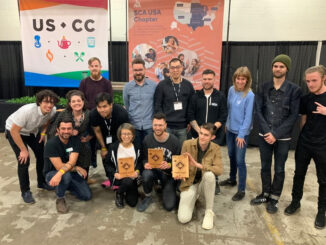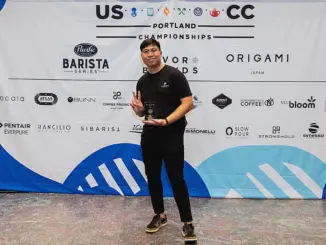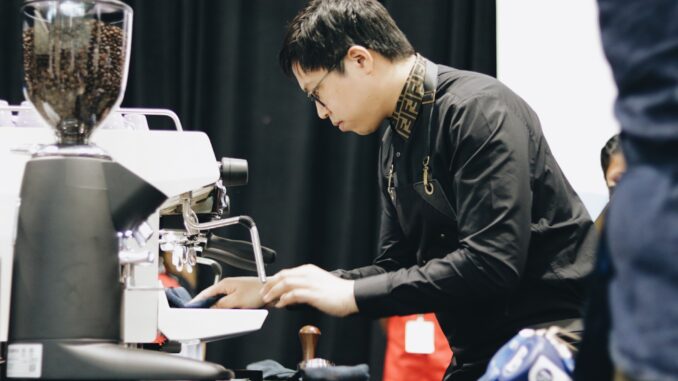
Piyapat Lapteerawut, who goes by the nickname Flook, discusses community, perseverance, and the future of U.S. latte art.
BY CHRIS RYAN
BARISTA MAGAZINE ONLINE
Cover photo courtesy of Natha Tungwongsakul
Note: This interview has been condensed for brevity.
Piyapat Lapteerawut was an engineering student who enjoyed studying in coffee shops when he decided he couldn’t get enough of the café atmosphere. Piyapat, better known by his nickname Flook, took a part-time job at a coffee shop seven years ago; when he moved to the United States five years ago, he continued working in coffee and discovered latte art. In the half-decade since, latte art has been his passion, and Flook has developed skills while strengthening bonds in the latte art community. Last year, Flook won the Latte Art World Championship Open (LAWCO) at Coffee Fest Atlanta. And last month, at the debut of the U.S. Latte Art Championship as part of the Specialty Coffee Expo in Boston, Flook added another title to his resume by winning that competition. We talked to Flook about discovering latte art, helping the U.S. latte art community hone their skills for the world stage, and much more.
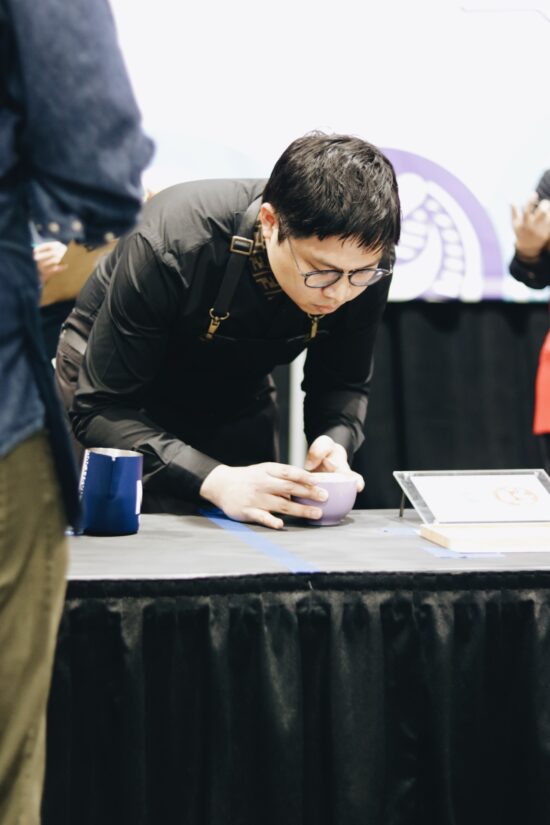
Chris Ryan: How’d you get interested in specialty coffee, and how long have you been in the industry? What is your day job currently?
Flook: I have been a barista for almost seven years; my coffee career started when I fell in love with the vibes of coffee shops while studying in them in college. I decided to take a part-time job in a café, and it became my passion. Now I’m head of the wholesale program at Coffee Project New York; I’m in charge of all wholesale clients, including selling and training, and making sure they serve our coffee properly.
What drew you to latte art, and what has been your journey of competing in throwdowns?
When I first moved to the U.S. five years ago, I was struggling to get a job as a barista—it’s especially hard when you’re a foreigner and the interviewer can’t even pronounce your name. Luckily, I met one barista friend and he introduced me to a thing called a “latte art throwdown.” I knew that this competition could help me build connections, and it was a place where I could show my skills and prove to people that I knew how to make coffee!
My first throwdown was in June 2017 in Washington, D.C., at Vigilante Coffee. I did so bad, but I kept telling myself: It doesn’t matter if you win or lose, it’s all about connections and hanging out with new friends. So my first few years competing, I never won anything, but I built a massive amount of connections in the industry.
And then at my first Coffee Fest LAWCO in Denver 2018, I lost in the second round by running out of time and getting disqualified—that’s how I got the nickname DQFlook that I use as my Instagram handle. That was the turning point for me: People making fun of me by calling me DQFlook made me feel like sh*t, but I used that negative energy to push myself, practice harder, and tell myself: “One day, I’ll prove to you that I can do it, I’m going to win Coffee Fest LAWCO.” And here we are: I did it. I won the Coffee Fest LAWCO in Atlanta in 2021.
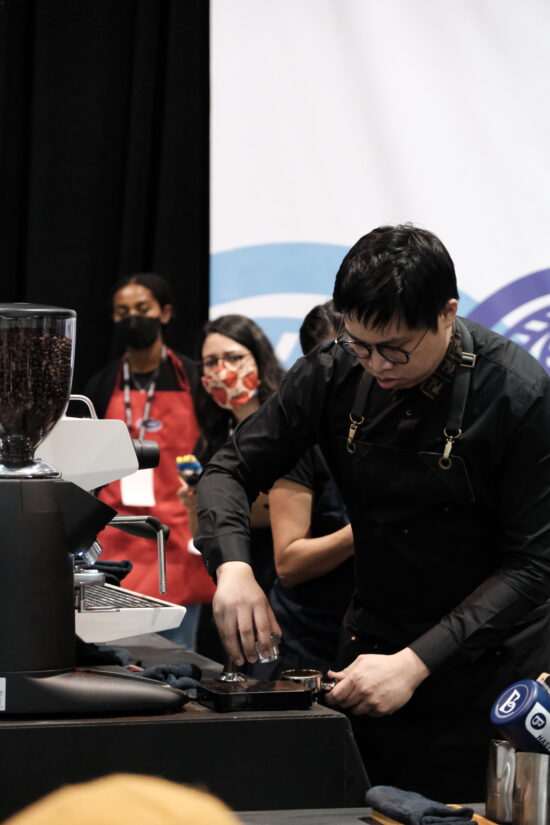
What made you want to compete in the U.S. Latte Art Championship?
I was thinking about how I could help uplift the latte art community, and I thought the U.S. Latte Art Championship stage would be the best fit. It took me several months to think about how I could wow the audience while also engaging them. I came up with a design that, when people see it, they will feel like, “I know it, I know Flook is going to do it. If Flook can do it, I can do it too.” My ultimate goal is to create the biggest impact in the U.S. latte art community. I want people to know that this is what you can do, and now it’s time to get out of your comfort zone and start doing it.
What do you think were the keys to you winning the U.S. Latte Art Championship?
The key was having a good mentality, and the fact that I really wanted to show my skills and inspire other baristas. One thing that helped me was practicing in different environments before the competition. I practiced at my space before heading to Boston, then Counter Culture hosted a practice session at their lab. I also practiced at a friend’s shop in Boston the day I competed. Every time I practiced, I was shaking, but I got more comfortable in different environments, different setups, and most importantly, different audiences.
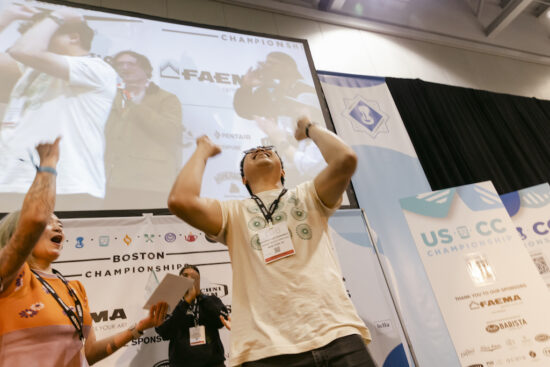
Finally, what are your feelings like now, following the competition? Because this is the first year of the U.S. Latte Art Championship, the winner doesn’t get to compete in worlds—how do you build off this victory then?
It feels great honestly, but not because I won. The best part of the competition was when I was stepping down from the stage. A lot of my friends walked up to me and said, “Bro, you just made me wanna be on that stage next year!” That’s it—that’s the goal. It’s not about winning or losing; it’s all about inspiring people.
It’s totally fine with me that I’m not going to the world stage in Milan this year. I see this year’s competitions as a first step—my next plan is to build a program or a platform that can help other folks who want to compete next year. How can we educate them properly? I don’t want to see people starting to pour complex designs randomly, like the way I did four years ago. I went through a ton of trial and error to master this skill. But now, we have good educational platforms, we have a lot of talented baristas—how can we match them together?


